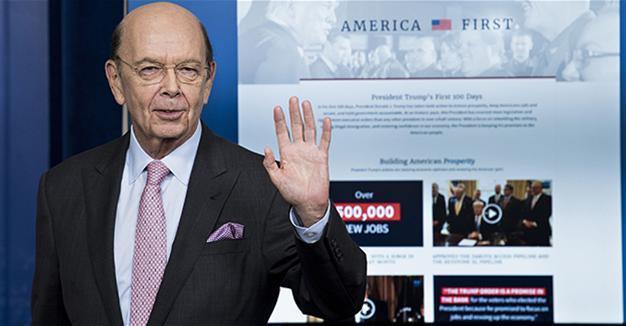US launches NAFTA renegotiation countdown
WASHINGTON - Agence France-Presse

AFP photo
The Trump administration on May 18 launched a 90-day countdown to renegotiating the North American Free Trade Agreement, part of its aggressive stance towards trade that it charges has hurt U.S. workers.
That combative posture was underscored just two hours later when the Commerce Department followed the news with the announcement of a new trade investigation against aircraft produced by NAFTA partner Canada, saying they receive unfair subsidies.
That follows on the heels of disputes with Canada over lumber imports and dairy exports, and with Mexico over sugar imports, just a small sample of the many trade disputes announced in the last three months.
Commerce Secretary Wilbur Ross said Thursday with the NAFTA announcement “we intend to notify not just Congress, but all our trading partners, that free and fair trade is the new standard for U.S. trade deals.”
“Since the signing of NAFTA, we have seen our manufacturing industry decimated, factories shuttered, and countless workers left jobless,” Ross said.
“President (Donald) Trump is going to change that.”
During the campaign, Trump vowed to withdraw from NAFTA, saying it was a disaster for U.S. workers. His repeated complaints that bad trade deals destroy American jobs gained him support among working class voters, who helped lift him to the White House.
But Trump backed away from the threat after Canadian and Mexican officials urged Washington to renegotiate and modernize -- rather than scrap -- the trade pact, which has boosted industry and created tight manufacturing, agriculture and business links throughout the region.
Newly-installed US Trade Representative Robert Lighthizer formally notified Congress of the intent to revamp the pact with Canada and Mexico, which accounts for about $1 trillion in annual trade.
Talks will begin no earlier than August 16, 2017, he said in a statement.
During the required 90-day period, USTR will consult with “Congress and American stakeholders to create an agreement that advances the interests of America’s workers, farmers, ranchers, and businesses,” he said.
Lighthizer said NAFTA had not kept up with changes in the economy and business over the last 25 years, including the boom in e-commerce.
“Many chapters are outdated and do not reflect modern standards,” he said.
White House ‘has not decided over nature of pact’
Ross last week said the White House had not yet decided whether to continue the pact as a three-nation deal, or split it into two separate bilateral agreements, something Canada and Mexico oppose. He promised a very aggressive negotiating schedule to conclude the talks as quickly as possible.
The announcement came as Mexico’s Foreign Secretary Luis Videgaray was meeting with US Secretary of State Rex Tillerson in Washington. The Mexican official said he welcomed the opportunity to update the agreement, but insisted it must remain trilateral.
“NAFTA is a trilateral agreement and the conversations need to be trilateral in nature. This is our position,” he said, arguing that continent-wide supply chains should make North America the most competitive region in the world.
Canada Foreign Affairs Minister Chrystia Freeland, who met with Lighthizer on May 16 and meets her Mexican counterparts in Mexico City next week, also said the negotiations must be among the three nations.
She defended the trade deal, which has been updated 11 times, but stressed that Canada will seek to get the best deal for its citizens.
“At the end of the day our objective is going to be to negotiate a great deal for Canadians,” she said, declining to give any details of Ottawa’s negotiating position.
But in an earlier statement she stressed that many US jobs depend on NAFTA which has created growth throughout the region.
“NAFTA’s track record is one of economic growth and middle-class job creation, both here in Canada and throughout North America,” she said.
“Nine million American jobs depend on trade and investment with Canada. Our integrated economies and supply chains support millions of jobs across the continent.”
U.S. Democratic Senator Charles Schumer said he will be watching the talks to make sure a new trade deal will “prioritize American workers and help to get middle-class incomes and jobs going again.
“So far, this administration’s trade policy has been characterized by a lot of talk and no action,” he said in a statement.
The National Foreign Trade Council, a pro-trade business group, echoed the sentiments of many economists in highlighting the benefits NAFTA has delivered to all the member nations, noting Canada and Mexico are the largest export markets for U.S. goods.
“This modernization must strengthen America’s competitiveness in the global economy rather than impose new barriers,” NFTC President Rufus Yerxa said in a statement.
